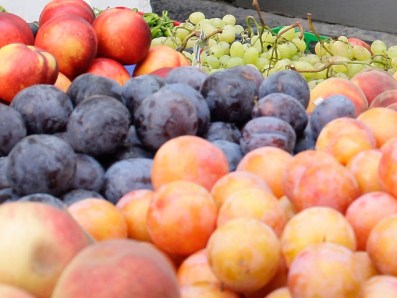The program is called Farm to School.
A newly hired Sustainable Agriculture Specialist wants the San Diego
Specialist wants the San Diego Unified School District to get a bigger share of its fruits and vegetables from local and organic farms
Unified School District to get a bigger share of its fruits and vegetables from local and organic farms . In these days of budget concerns, the Specialist didn't cost the School District a dime.
. In these days of budget concerns, the Specialist didn't cost the School District a dime.
Farm to School Specialist Vanessa Zajfen is picking fresh produce, with grower Robin Taylor, at Suzie's Organic Farm in Imperial Beach
"We want kids to know how tasty fresh fruits and vegetables can be, specifically those that are grown in their own backyard," Zajfen said.
Zajfen has a Master's degree in Sustainable Agriculture
She was hired with Federal Stimulus
"Food doesn't just come from the grocery store, it doesn't just come from a plastic and paper bag, there is a whole other side to it that I think kids are not exposed to," Zajfen said.
But on this day, students will be exposed to produce picked that morning. Zajfen and Food Services Director Gary Petill prepared the first locally grown organic salad bar, at Kearney High School.
Going with all local produce at every school will take time, but that is their initial goal.
"We want to be at about 25% of all of our produce to be locally grown from our farmers and growers," Petill said. We think that's aggressive, but we think it's also achievable."
On the first day, Petill stood behind the salad bar welcoming students, "Welcome to the organic salad bar."
"Try some of the organic lettuce, it came out of the ground this morning," Petill exclaimed.
Students load up, and dig in. What do they think of the organic salad bar?
"It was more fresh that the ones we usually have," one of the students said.
"It was nice to have something pesticide free, you know, something real, you know," another student explained.
Food Services wants to keep it real and get more local growers involved with the Farm to School program.
Eventually, Food Services would like to take on the responsibility of processing and delivering local produce to all San Diego Unified Schools .
.
Petill says it would be cheaper for the District, instead of having produce shipped in from other countries or driven in from other states.
"We want to actually take it from the farm to our table and to wash it and bag it and send it off to our schools with our own drivers and it keep all of our work in house, so we're in-sourcing our own people to do the work," Petill said.
Zajfen says these changes will hopefully change eating habits.
"Being able to influence them when they're young and continue to nurture them and expose them to these amazing programs and good foods, fresh fruits, and vegetables and actually watch them grown and mature into good healthy eaters, is really what we're trying to do here with our Farm to School Program," Zajfen said.
Beginning in October, Food Services will also feature a "Harvest of the Month." Every Wednesday, for a month, a local grower's produce will be featured at every school's salad bar. Next month, it will be locally grown organic Valencia oranges.


